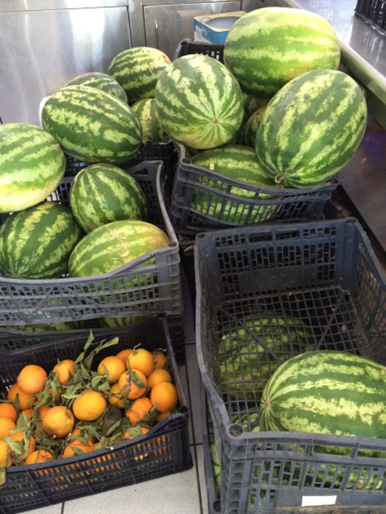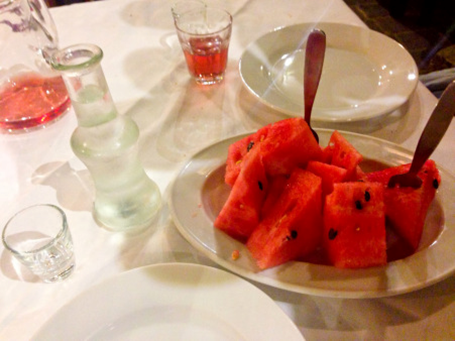CPTnet
18 October 2016
MEDITERRANEAN REFLECTION: Give and take–distributing watermelon on Lesvos
by Lisa Trocchia-Balkits
[Trocchia-Balkits’ reflection has been adapted for CPTnet. The original is available on CPT-Mediterranean’s blog.]
 Aside from the thick wall of heat glomming on to my body as
Aside from the thick wall of heat glomming on to my body as
I walk into the uncooled space of the camp kitchen where I am scheduled to
spend the next four hours, the large mound of watermelon stacked in crumpled
plastic crates on the floor grabs my attention first.
I thought I would try to stay within my comfort zone the
first morning in the refugee camp. I volunteer for the job of food distribution,
receive a knife and am told to start quartering the watermelons lengthwise. Who
brings this watermelon here? Do they come every day? Are they from local
farmers? How many should I cut? Nobody–of the handful of volunteers standing
around finishing their coffees–knows. All I get, for sure, is that I need to
split a few of the long quarters in half for the smaller families and
individuals.
I take a hefty melon from the pile in the corner and set it
on my cutting board. My hands sense a sort of magical energy tension at the
point just before the knife-edge touches the watermelon, and it splits
willingly. It cracks open with rough edges, creating an uneven topographical
surface of ripe, red flesh on each half. Working with another volunteer, a
young man from Berlin, we smile each time this happens, but otherwise,
wordlessly fill a plastic crate, arranging the wedges so they will rise with
reasonable stability just over the edges.
 Greek watermelons! Καρπούζι! Even though watermelon is
Greek watermelons! Καρπούζι! Even though watermelon is
synonymous with summertime picnics in the U.S., my strongest associations with
them come from Crete.
When you eat out in
Crete, hunks of juicy, cooling watermelon are delivered to your table on a communal
plate with as many small forks as are in your group and come with a small
carafe of raki. The watermelon is always on the house. For me, there is an
expanding, almost child-like joy in this ritual. This free slice of juicy melon
is a performance of give and take, enacted by eater and host alike. One never
expects (but secretly anticipates) this gift, and the host is always praised
for their demonstration of generosity.
As I bring the crate into the distribution room, along with
the other items of food available today, I begin to feel that this crated pile
of watermelon wedges–certainly free for the refugees of Pikpa–is something more
than food. Although I can’t wrap my head
completely around it, it has to do with experiencing the give and take in all things.
Or is it the idea of free? Is it sweetness tasted by virtue of bitterness
experienced? Something free enjoyed because of freedom lost?
The performance and ritual of food. Give and take. Generosity and joy, gratitude and shame. I
look into the deep, dark, tired eyes of the woman before me, her hands
outstretched, ready to take the quarter chunk of watermelon I am giving her for
her family and I am repulsed by any sense that she should enact gratitude–especially
to me, a citizen of the country that has destroyed her life as she once enjoyed
it, and give-for-take, exchanged my freedom for one she may never know again.



